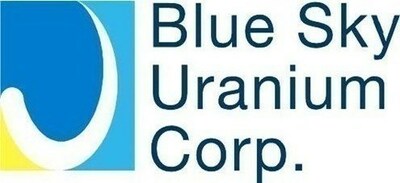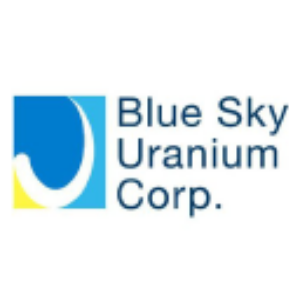Blue Sky Uranium Provides an Update on Activities at its Amarillo Grande Uranium Project, Argentina
TSX Venture Exchange: BSK
Frankfurt Stock Exchange: MAL2
OTCQB Venture Market (OTC): BKUCF
As an update to the process design testwork program for Ivana (see April 6, 2021 News Release), uranium/vanadium leach tests have been completed on the ~294 kg averaging 530ppm U3O8 composite bulk sample #2 prepared from RC chips from the Ivana deposit. The optimized leach conditions were 60 g/L Na2CO3 and 10 g/L NaHCO3, at 95°C for 8 hours. For these new tests, uranium recovery for the alkaline leach stage was
In December 2018, Blue Sky completed a first set of process design tests for the Ivana uranium-vanadium mill. Based on this test work, the overall process plant recovery was
Preparations are underway for testing the next step in the milling process: membrane filtration. Four litres of leach solution have been prepared for the small-scale membrane filtration tests, which will identify the best nanofiltration and reverse osmosis membranes for the process. Leaching of the remainder of mineralized sample #2 is underway to provide feed for the larger scale membrane filtration operation, which will provide solutions for subsequent solvent extraction tests.
Modelling work using external consultants has been advancing to evaluate the impact of the additional 3,346m of drilling in 350 RC drill holes and additional density measurements carried out in 2022 on the projects' current mineral resources and the PEA completed in 2019. This work was carried out to refine the boundaries of the deposit and to potentially upgrade the category of mineral resources from inferred to indicated where possible.
The previously announced RC drilling at Ivana East has been delayed due to technical issues with the drilling rig and will resume once it has been repaired. This program is part of the Company's staged approach to evaluating targets with-in several tens of kilometres from the Ivana deposit that could add to the projects resource base.
Drilling at Ivana Central was initially launched in 2020, later suspended due to pandemic effect, and finally completed in 2022. The program totaled 2,607m of drilling in 43 scout holes (Figure 1); the first 6 holes drilled in 2020 were reverse circulation (RC) holes, the following 36 holes were drilled by direct circulation (DC) due to the geological conditions, and the last (AGIC-043) was drilled DC for the initial 31m and was completed as a diamond drill hole with core recovered. Radiometric borehole surveys were run from hole AGIC-007 to AGIC-043. It was not possible to survey the initial 6 RC holes due to the geological conditions. All holes were vertical, and due to flat strata, sample results are believed to approximate true thickness.
Based on borehole radiometric anomalies and chip logging, the target REDOX front is understood to have been intercepted in 18 holes, delineating a +2.4km long and +1km wide NNW-SSE corridor at between 40m and 60m, open to the north and south (see Figure 2 and Figure 3). This REDOX front is characterized by "black" sandstones with organic matter and disseminated pyrite, accompanied by radiometric anomalies in most cases. This "black sand" horizon was initially identified at hole AGIC-01, where it yielded 1m @ 120ppm U3O8 at 46m in depth.
A total of 281 1m samples were collected from RC holes AGIC 001-006; Uranium ranged from less than detection to 120 ppm U3O8 in 1m samples. Only 56 cutting samples were recovered from the scout drillholes AGIC -007 to AGIC 042 due to recovery limitations; samples recovered from these holes designed for prospecting have potential for contamination due to the DC drilling technique employed. Uranium ranged from less than detection to 32 ppm U3O8 from 1m samples. Radiometric probe results ranged up to 1442 cps (AGC-028), a result consistent with uranium results in the 150 ppm U range based on correlation with other drilling on the project (see Table 1).
Hole AGIC-043, the last in the program, was drilled in order to better define and assess the geological characteristics of the REDOX front with anomalous uranium and radiometric levels that had been intersected by previous DC drilled holes. The recovery of drill core in AGIC-043 permitted detailed logging of the geological units and the collection of better-quality samples. The hole cut predominantly fine tuffaceous sediments from surface to 38m in depth, and predominantly sandy sediments from 38 to 63m in depth, ending the hole with more fine tuffaceous material at 65m. The black sand horizon was intersected between 46 and 62m in depth, interpreted as the REDOX front. Multiple samples with elevated silver-cobalt-copper-uranium-tungsten were observed in the analytical results and, and in the case of the high-silver samples (0.35m at 2880 ppm Ag), the core permitted re-sampling of ¼ core for confirmation analyses. Highlights of the AGIC-043 drill results include:
- 1.0m at 43 ppm Ag, 47ppm Cu and 1.3 ppm U3O8 from 39m
- 0.35m at 2880 ppm Ag, 4720 ppm Cu and 16 ppm U3O8 from 46m
- 0.5m at 89 ppm Ag, 202 ppm Cu and 13 ppm U3O8 from 49m
- 0.3m at 19 ppm Ag, 50ppm Cu and 72ppm U3O8 from 60.7m
Two additional discontinuous radiometric anomalous "black sand" horizons were intercepted at shallower depths in the 20-30m depth range in several holes. These black sand units correlate with chargeability anomalies identified in the IP Pole-Dipole surveys covering the area (see September 19, 2019 News Release, filed on SEDAR). Further follow-up of the projected extent of the REDOX front at Ivana Central and assessing of the high-grade silver potential is being carried out by the Company.
Regional prospecting mapping, sampling, and radiometric surveys have been carried out over the southern sector of the Amarillo Grande project. The program is collecting soil samples for detection of Pb-isotopic anomalies that may be related to uranium-sandstone type deposit or REDOX fronts. The exploration efforts are completed with pit sampling or auger drilling when uranium mineralization and/or radiometric anomalies are detected while mapping.
Drill samples were sent to ALS Argentina for preparation by drying, crushing to
The metallurgical program is conducted under the guidance of Chuck Edwards, P. Eng. FCIM, an independent consultant to the Company and a Qualified Person as defined in National Instrument 43-101. The contents of this news release have been reviewed and approved by Mr. Edwards.
The design of the Company's exploration program was undertaken by the Company's geological staff under the supervision of David Terry, Ph.D., P. Geo. Dr. Terry is a Director of the Company and a Qualified Person as defined in National Instrument 43-101. The contents of this news release have been reviewed and approved by Dr. Terry.
The Company's
The Project includes several other target areas over a regional trend, at or near surface. The area is flat-lying, semi-arid and accessible year-round, with nearby rail, power and port access. The Company's strategy includes delineating resources at multiple areas and advancing the project to prefeasibility level.
For additional details on the project and properties, please see the Company's website: www.blueskyuranium.com.
Blue Sky Uranium Corp. is a leader in uranium discovery in
ON BEHALF OF THE BOARD
"Nikolaos Cacos"
_____________________________________
Nikolaos Cacos, President, CEO and Director
Neither TSX Venture Exchange nor its Regulation Services Provider (as that term is defined in policies of the TSX Venture Exchange) accepts responsibility for the adequacy or accuracy of this release.
This news release may contain forward-looking statements. Forward-looking statements address future events and conditions and therefore involve inherent risks and uncertainties. All statements, other than statements of historical fact, that address activities, events or developments the Company believes, expects or anticipates will or may occur in the future, including, without limitation, statements about the Company's plans for its mineral properties; the Company's business strategy, plans and outlooks; the future financial or operating performance of the Company; and future exploration and operating plans are forward-looking statements.
Forward-looking statements are subject to a number of risks and uncertainties that may cause the actual results of the Company to differ materially from those discussed in the forward-looking statements and, even if such actual results are realized or substantially realized, there can be no assurance that they will have the expected consequences to, or effects on, the Company. Factors that could cause actual results or events to differ materially from current expectations include, among other things: the impact of COVID-19; risks and uncertainties related to the ability to obtain, amend, or maintain licenses, permits, or surface rights; risks associated with technical difficulties in connection with mining activities; and the possibility that future exploration, development or mining results will not be consistent with the Company's expectations. Actual results may differ materially from those currently anticipated in such statements. Readers are encouraged to refer to the Company's public disclosure documents for a more detailed discussion of factors that may impact expected future results. The Company undertakes no obligation to publicly update or revise any forward-looking statements, unless required pursuant to applicable laws. We advise U.S. investors that the SEC's mining guidelines strictly prohibit information of this type in documents filed with the SEC. U.S. investors are cautioned that mineral deposits on adjacent properties are not indicative of mineral deposits on our properties.
![]() View original content to download multimedia:https://www.prnewswire.com/news-releases/blue-sky-uranium-provides-an-update-on-activities-at-its-amarillo-grande-uranium-project-argentina-301832954.html
View original content to download multimedia:https://www.prnewswire.com/news-releases/blue-sky-uranium-provides-an-update-on-activities-at-its-amarillo-grande-uranium-project-argentina-301832954.html
SOURCE Blue Sky Uranium Corp.







